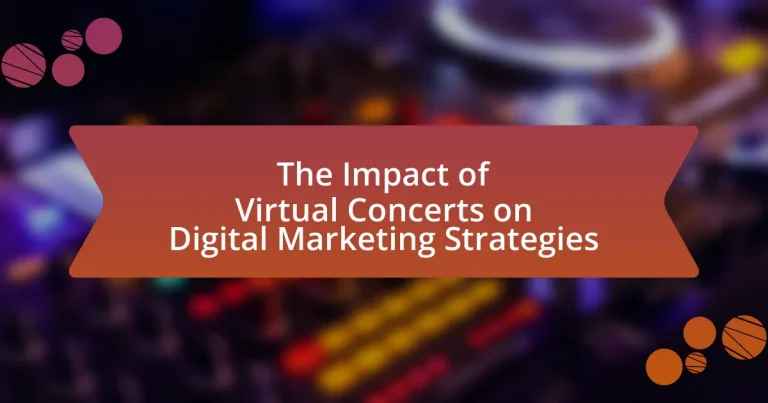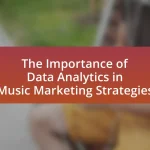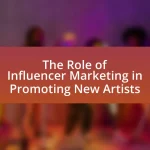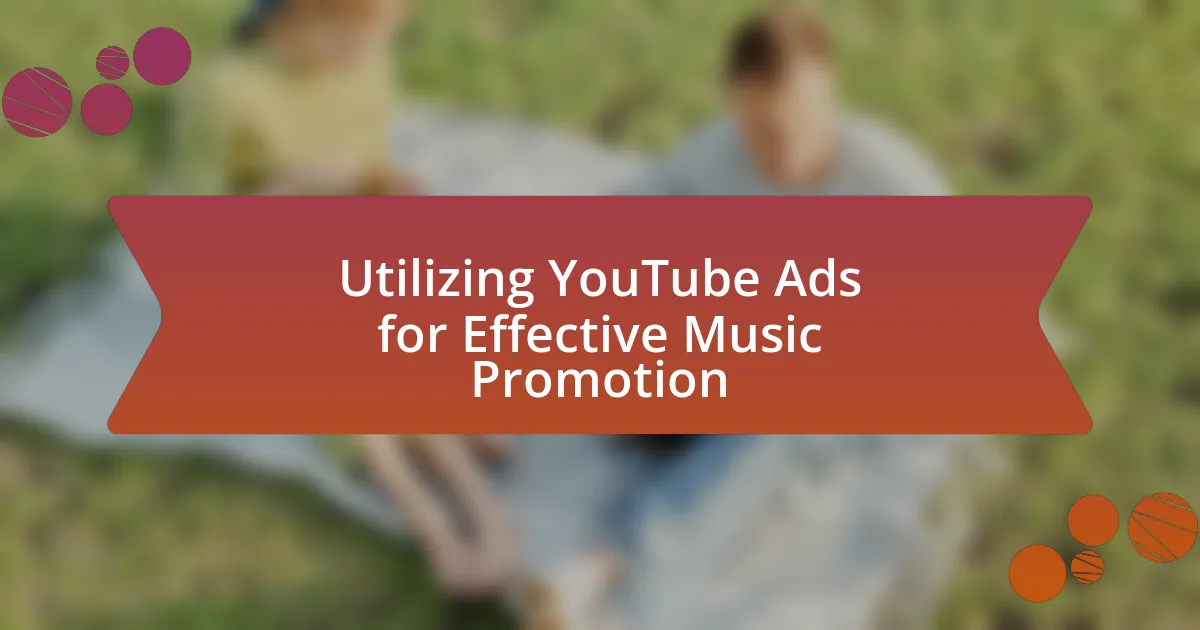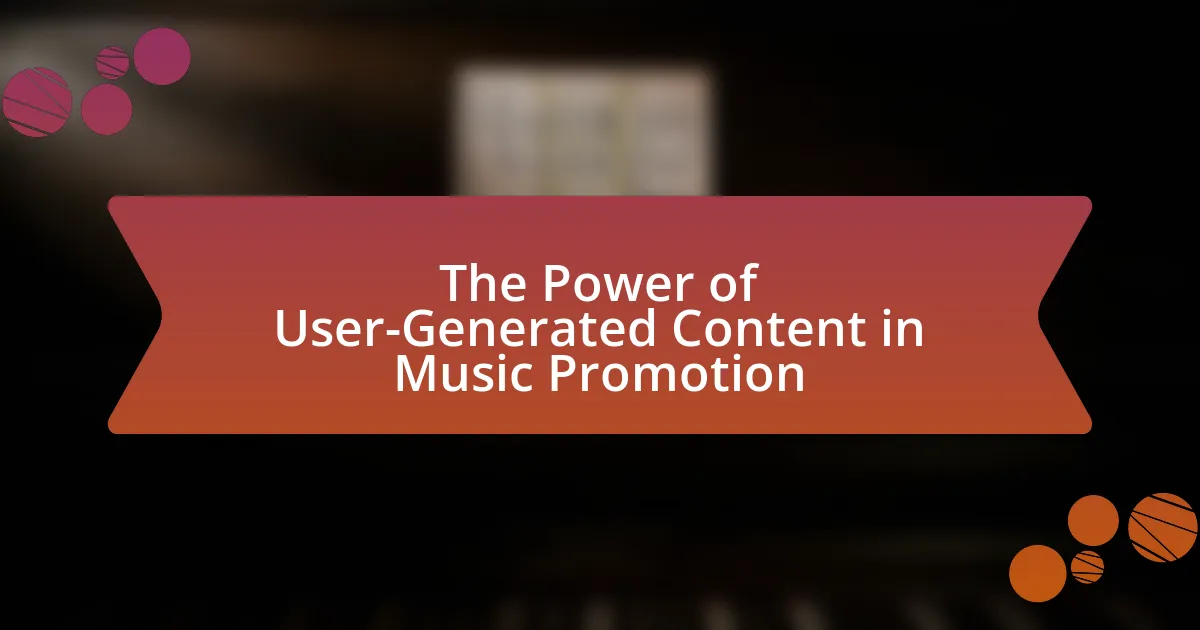Virtual concerts are online musical performances that enable artists to connect with global audiences, significantly influencing digital marketing strategies. This article explores the evolution of virtual concerts, highlighting technological advancements that enhance audience engagement and differentiate them from traditional concerts. It examines the unique opportunities virtual concerts present for brands, including increased visibility and interactive marketing strategies, while addressing challenges such as audience engagement and technical difficulties. Key components of effective digital marketing for virtual concerts, including social media promotion, influencer partnerships, and data analytics, are also discussed, providing insights into best practices for maximizing impact and success in this evolving landscape.
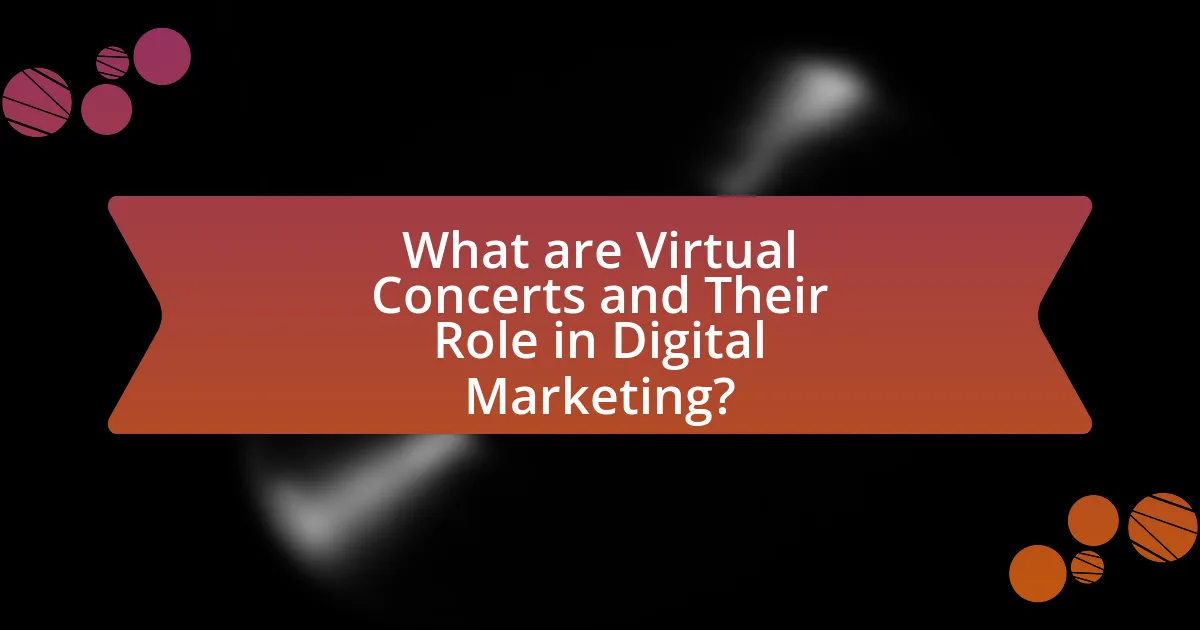
What are Virtual Concerts and Their Role in Digital Marketing?
Virtual concerts are live musical performances that occur online, allowing artists to reach global audiences without physical venue constraints. They play a significant role in digital marketing by providing brands with innovative ways to engage consumers, enhance brand visibility, and create unique experiences. For instance, according to a report by Eventbrite, 75% of attendees at virtual events are likely to purchase products from brands featured during the event, demonstrating the effectiveness of virtual concerts in driving sales and brand loyalty. Additionally, virtual concerts often utilize social media platforms for promotion, amplifying reach and engagement, which is crucial for modern digital marketing strategies.
How have virtual concerts evolved in recent years?
Virtual concerts have significantly evolved in recent years, transitioning from simple live-streamed performances to immersive, interactive experiences. This evolution has been driven by advancements in technology, such as high-definition streaming, virtual reality, and augmented reality, which enhance audience engagement. For instance, platforms like Fortnite and Roblox have hosted virtual concerts featuring major artists, attracting millions of viewers and creating new revenue streams through in-game purchases and sponsorships. Additionally, the COVID-19 pandemic accelerated this trend, as artists sought alternative ways to connect with fans while traditional venues were closed, leading to a surge in virtual event platforms and innovative marketing strategies that leverage social media and digital advertising to reach wider audiences.
What technological advancements have facilitated virtual concerts?
Technological advancements such as high-speed internet, streaming platforms, virtual reality (VR), and augmented reality (AR) have facilitated virtual concerts. High-speed internet enables seamless streaming of live performances to global audiences, while streaming platforms like YouTube and Twitch provide accessible venues for artists to reach fans. VR technology allows for immersive concert experiences, enabling viewers to feel as if they are physically present at the event. Additionally, AR enhances the visual experience by overlaying digital elements onto the real world, creating engaging interactions during performances. These advancements collectively enhance audience engagement and broaden the reach of artists, significantly impacting digital marketing strategies in the music industry.
How do virtual concerts differ from traditional concerts?
Virtual concerts differ from traditional concerts primarily in their format and accessibility. Traditional concerts occur in physical venues where audiences gather in person, while virtual concerts are streamed online, allowing viewers to participate from anywhere with an internet connection. This shift enables artists to reach a global audience without geographical limitations, as evidenced by the significant increase in viewership during events like Travis Scott’s virtual concert in Fortnite, which attracted over 12 million attendees. Additionally, virtual concerts often incorporate interactive elements, such as live chats and social media integration, enhancing audience engagement compared to the more passive experience of traditional concerts.
Why are virtual concerts significant for digital marketing strategies?
Virtual concerts are significant for digital marketing strategies because they provide brands with a unique platform to engage audiences in an interactive and immersive environment. This engagement is amplified by the ability to reach a global audience, as virtual concerts eliminate geographical barriers, allowing brands to connect with diverse demographics simultaneously. According to a report by Eventbrite, 75% of attendees at virtual events are more likely to engage with brands that sponsor or participate in these events, highlighting the effectiveness of virtual concerts in enhancing brand visibility and consumer interaction.
What unique opportunities do virtual concerts present for brands?
Virtual concerts present brands with unique opportunities for enhanced audience engagement and targeted marketing. These events allow brands to reach a global audience without geographical limitations, significantly increasing their visibility. For instance, a report by Eventbrite indicates that virtual events can attract up to 10 times more attendees than traditional in-person concerts, enabling brands to connect with diverse demographics. Additionally, brands can leverage interactive features such as live chats, polls, and social media integration during virtual concerts to foster real-time engagement, creating a more immersive experience. This level of interaction not only strengthens brand loyalty but also provides valuable data on consumer preferences and behaviors, which can inform future marketing strategies.
How do virtual concerts enhance audience engagement?
Virtual concerts enhance audience engagement by providing interactive experiences that allow fans to connect with artists and each other in real-time. These events often incorporate features such as live chats, polls, and virtual meet-and-greets, which foster a sense of community and participation among viewers. For instance, a study by Eventbrite found that 70% of attendees felt more connected to the artist during virtual concerts due to these interactive elements. Additionally, the accessibility of virtual concerts allows a broader audience to participate, breaking geographical barriers and increasing overall engagement levels.
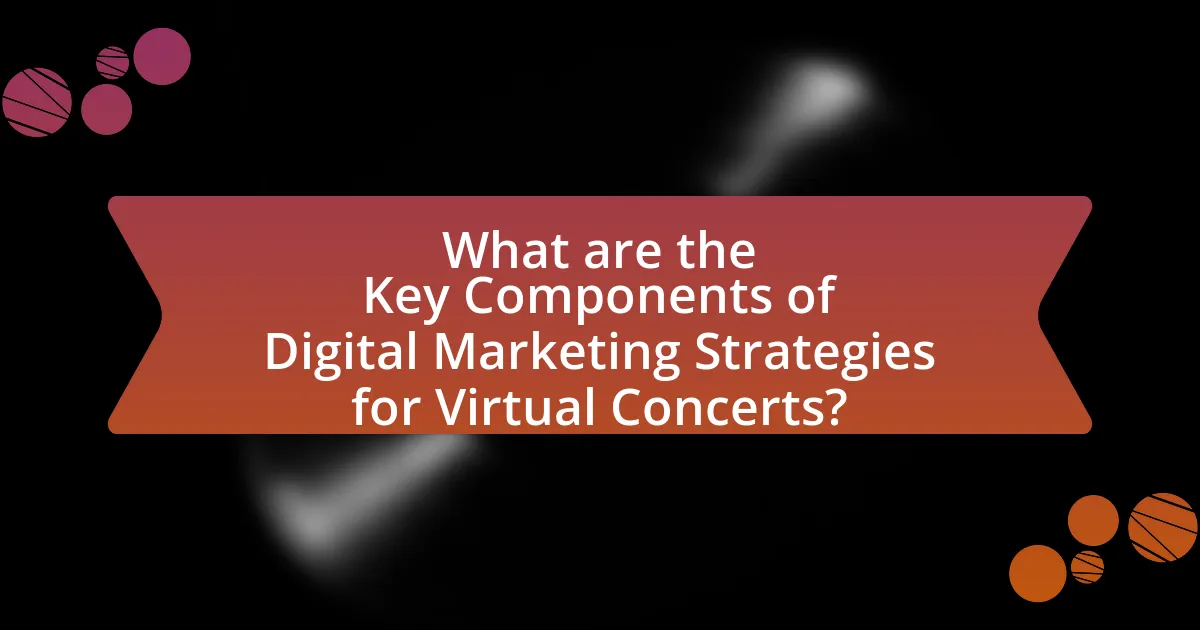
What are the Key Components of Digital Marketing Strategies for Virtual Concerts?
The key components of digital marketing strategies for virtual concerts include social media promotion, targeted advertising, influencer partnerships, email marketing, and engaging content creation. Social media promotion leverages platforms like Instagram and Facebook to reach a broad audience, while targeted advertising uses data analytics to focus on specific demographics, increasing conversion rates. Influencer partnerships enhance credibility and expand reach through established fan bases. Email marketing allows for direct communication with fans, providing updates and exclusive content. Engaging content creation, such as behind-the-scenes videos and interactive live streams, fosters community and enhances audience participation. These components collectively drive ticket sales and enhance brand visibility in the competitive landscape of virtual events.
How do social media platforms play a role in promoting virtual concerts?
Social media platforms are crucial in promoting virtual concerts by providing a wide-reaching and interactive space for artists to engage with their audience. These platforms enable artists to share live updates, behind-the-scenes content, and promotional materials, which can significantly increase visibility and anticipation for the event. For instance, a study by Eventbrite found that 80% of event organizers use social media to promote their events, highlighting its effectiveness in reaching potential attendees. Additionally, features like live streaming, event pages, and targeted advertising on platforms such as Facebook and Instagram allow for real-time engagement and tailored marketing strategies, further enhancing the promotional efforts for virtual concerts.
What types of content are most effective for social media promotion?
Visual content, particularly videos and images, is the most effective type of content for social media promotion. Research indicates that posts with visuals receive 94% more views than those without, significantly increasing engagement rates. Additionally, live videos generate six times more interactions than standard videos, highlighting their effectiveness in capturing audience attention. Furthermore, user-generated content fosters community and trust, as 79% of consumers say user-generated content highly impacts their purchasing decisions. These statistics demonstrate that leveraging visual and interactive content is crucial for successful social media marketing strategies.
How can influencers enhance the reach of virtual concert marketing?
Influencers can enhance the reach of virtual concert marketing by leveraging their established audiences to promote events, thereby increasing visibility and engagement. Their ability to create authentic content and share personal experiences with their followers can drive interest and attendance. For instance, a study by Influencer Marketing Hub found that 49% of consumers depend on influencer recommendations for their purchasing decisions, highlighting the effectiveness of influencers in shaping audience behavior. Additionally, influencers can utilize various platforms, such as Instagram and TikTok, to share live updates, behind-the-scenes content, and exclusive promotions, further amplifying the concert’s reach and engagement metrics.
What role does email marketing play in virtual concert promotions?
Email marketing plays a crucial role in virtual concert promotions by enabling direct communication with fans and potential attendees. It allows promoters to share event details, ticket sales, and exclusive content, fostering engagement and driving ticket purchases. According to a study by the Direct Marketing Association, email marketing has an average return on investment of $42 for every dollar spent, highlighting its effectiveness in reaching targeted audiences. Additionally, personalized email campaigns can increase open rates by 26%, further enhancing the likelihood of concert attendance.
What strategies can be employed for effective email campaigns?
Effective email campaigns can be achieved through segmentation, personalization, and A/B testing. Segmentation involves dividing your email list into specific groups based on demographics or behavior, which allows for targeted messaging that resonates with each group. Personalization enhances engagement by tailoring content to individual preferences, increasing open and click-through rates; studies show that personalized emails can lead to a 29% higher open rate. A/B testing enables marketers to compare different subject lines, content, or send times to determine what performs best, leading to continuous improvement in campaign effectiveness. These strategies collectively enhance the relevance and impact of email communications in the context of digital marketing, particularly for virtual concerts, where audience engagement is crucial.
How can segmentation improve email marketing outcomes for virtual concerts?
Segmentation can significantly improve email marketing outcomes for virtual concerts by allowing marketers to tailor content to specific audience groups, thereby increasing engagement and conversion rates. By analyzing data such as past ticket purchases, engagement levels, and demographic information, marketers can create targeted campaigns that resonate with different segments, such as loyal fans, casual listeners, or new subscribers. Research indicates that segmented email campaigns can lead to a 14.31% higher open rate and a 100.95% higher click-through rate compared to non-segmented campaigns. This targeted approach not only enhances the relevance of the messaging but also fosters a stronger connection between the artist and the audience, ultimately driving higher attendance and revenue for virtual concerts.
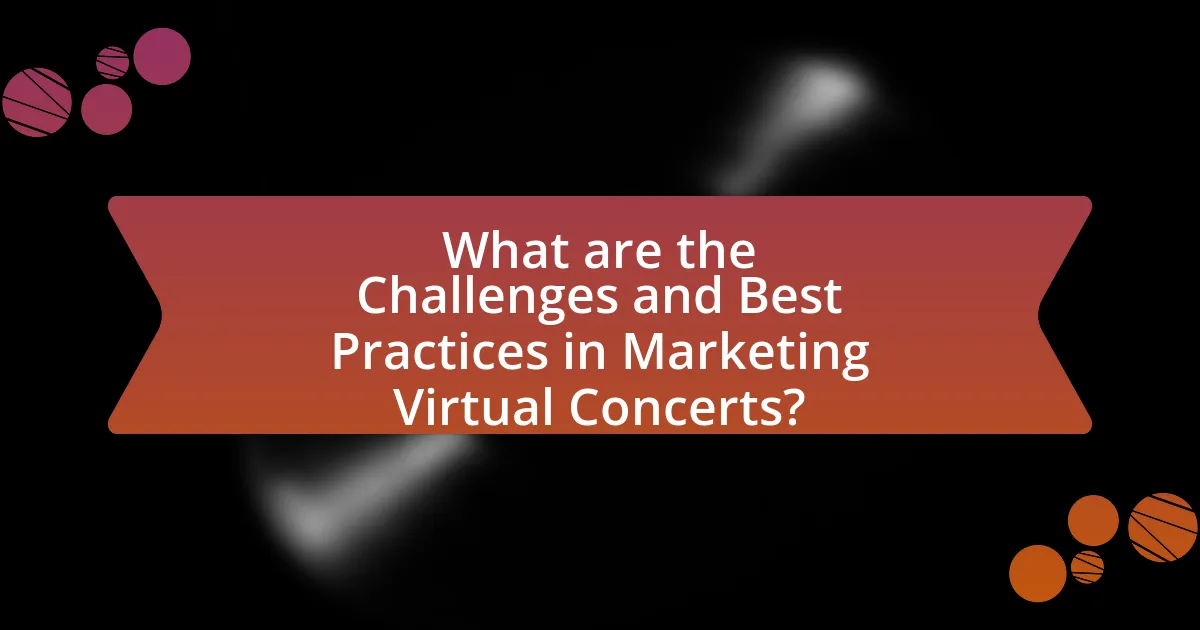
What are the Challenges and Best Practices in Marketing Virtual Concerts?
Marketing virtual concerts presents challenges such as audience engagement, competition, and technology limitations. Engaging audiences in a saturated market requires innovative strategies, as many events compete for attention. Additionally, technical issues like streaming quality can hinder viewer experience, impacting attendance and satisfaction.
Best practices include leveraging social media for promotion, utilizing targeted advertising, and creating interactive experiences. Social media platforms like Instagram and TikTok can amplify reach, while targeted ads ensure the right demographics are engaged. Interactive elements, such as live Q&A sessions or virtual meet-and-greets, enhance viewer involvement and satisfaction, leading to higher retention rates.
According to a report by Eventbrite, 70% of virtual event attendees prefer interactive experiences, highlighting the importance of engagement strategies in successful marketing.
What common challenges do marketers face when promoting virtual concerts?
Marketers face several common challenges when promoting virtual concerts, including audience engagement, competition for attention, and technological barriers. Audience engagement is crucial, as virtual formats can lead to lower interaction levels compared to in-person events, making it difficult to create a sense of community. Competition for attention is intense, with numerous online events and content vying for viewers, which can dilute marketing efforts. Additionally, technological barriers, such as streaming quality and accessibility issues, can hinder the user experience, impacting attendance and overall success. These challenges necessitate innovative strategies to effectively reach and engage target audiences in the digital landscape.
How can brands overcome technical difficulties during virtual events?
Brands can overcome technical difficulties during virtual events by implementing thorough pre-event testing and utilizing reliable technology platforms. Conducting extensive tests on all equipment, software, and internet connections before the event ensures that potential issues are identified and resolved in advance. According to a study by Eventbrite, 70% of event organizers reported that technical rehearsals significantly reduced problems during live events. Additionally, selecting established platforms known for their stability and support can minimize disruptions, as these platforms often provide resources and assistance to troubleshoot issues in real-time.
What strategies can mitigate audience fatigue from virtual events?
To mitigate audience fatigue from virtual events, organizers should implement strategies such as varying content formats, incorporating interactive elements, and optimizing event duration. Varying content formats, such as mixing live presentations with pre-recorded segments, keeps the audience engaged by providing diverse experiences. Incorporating interactive elements, like polls and Q&A sessions, fosters participation and maintains attention, as studies show that interactive sessions can increase engagement by up to 70%. Optimizing event duration by limiting sessions to 30-60 minutes helps prevent cognitive overload, as research indicates that attention spans diminish significantly after prolonged periods of screen time. These strategies collectively enhance audience engagement and reduce fatigue during virtual events.
What best practices should be followed for successful virtual concert marketing?
Successful virtual concert marketing requires a strategic approach that includes leveraging social media, engaging with audiences, and utilizing data analytics. Social media platforms like Instagram, Facebook, and TikTok are essential for promoting events, as they allow artists to reach a broad audience and create buzz through targeted ads and organic posts. Engaging with audiences through interactive content, such as live Q&A sessions or behind-the-scenes footage, fosters a sense of community and increases viewer investment in the concert. Additionally, utilizing data analytics helps marketers understand audience preferences and behaviors, enabling them to tailor their marketing strategies effectively. According to a report by Eventbrite, 70% of event organizers believe that social media is crucial for promoting virtual events, highlighting its importance in successful marketing efforts.
How can data analytics improve marketing strategies for virtual concerts?
Data analytics can significantly enhance marketing strategies for virtual concerts by providing insights into audience behavior and preferences. By analyzing data from social media interactions, ticket sales, and viewer engagement metrics, marketers can identify target demographics and tailor their promotional efforts accordingly. For instance, a study by Eventbrite found that 70% of event organizers who utilized data analytics reported improved audience targeting and increased ticket sales. This data-driven approach allows for more effective advertising campaigns, optimized pricing strategies, and personalized content, ultimately leading to higher attendance and revenue for virtual concerts.
What are the key metrics to track for evaluating success in virtual concert marketing?
The key metrics to track for evaluating success in virtual concert marketing include audience engagement, ticket sales, social media reach, and post-event feedback. Audience engagement can be measured through metrics such as live stream views, chat interactions, and participation in polls or Q&A sessions, indicating how actively the audience is involved. Ticket sales provide a direct measure of financial success, reflecting the concert’s marketability and appeal. Social media reach assesses the effectiveness of promotional efforts, including shares, likes, and comments across platforms, which can amplify visibility and attract new audiences. Post-event feedback, gathered through surveys or reviews, offers insights into audience satisfaction and areas for improvement, helping to refine future marketing strategies. These metrics collectively provide a comprehensive view of a virtual concert’s success and its impact on digital marketing strategies.
What practical tips can enhance digital marketing strategies for virtual concerts?
To enhance digital marketing strategies for virtual concerts, utilize targeted social media advertising to reach specific demographics. This approach allows marketers to tailor ads based on user interests and behaviors, increasing engagement rates. For instance, a study by Hootsuite found that targeted ads can improve conversion rates by up to 50%. Additionally, leveraging influencer partnerships can amplify reach; influencers can promote the concert to their followers, creating authentic connections. According to a report by Nielsen, 92% of consumers trust recommendations from individuals over brands. Finally, implementing interactive elements such as live Q&A sessions or polls during the concert can boost audience participation and retention, as evidenced by a survey from Eventbrite, which indicated that interactive features increase viewer satisfaction by 30%.
